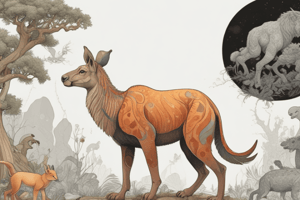Podcast
Questions and Answers
بازی چگونه میتواند در کاهش استرس و اضطراب مؤثر باشد؟
بازی چگونه میتواند در کاهش استرس و اضطراب مؤثر باشد؟
- کمک به افزایش منابع مالی
- با ایجاد شرایط رقابتی
- تسهیل در تخلیه عاطفی (correct)
- افزایش فشار روانی
چگونه بازی میتواند به یادگیری و انگیزش کمک کند؟
چگونه بازی میتواند به یادگیری و انگیزش کمک کند؟
- ایجاد فشار روانی بر روی کودکان
- فراهم کردن انگیزش درونی و درگیرکردن در فعالیتها (correct)
- کاهش تمایل به کاوش
- افزایش خستگی در یادگیری
کدام یک از موارد زیر به عنوان تأثیرات مثبت بازی بر خلاقیت شناخته میشود؟
کدام یک از موارد زیر به عنوان تأثیرات مثبت بازی بر خلاقیت شناخته میشود؟
- تقویت اندیشه خلاق و حل مسئله نوآورانه (correct)
- تقلید از ایدهها بدون پیشرفت
- محدود کردن آزادی عمل در ایدهپردازی
- کاهش توانایی حل مسئله
چرا یادگیری مبتنی بر بازی میتواند مؤثرتر از روشهای یادگیری سنتی باشد؟
چرا یادگیری مبتنی بر بازی میتواند مؤثرتر از روشهای یادگیری سنتی باشد؟
چگونه بازی میتواند نماد ارزشها و باورهای فرهنگی باشد؟
چگونه بازی میتواند نماد ارزشها و باورهای فرهنگی باشد؟
کدام یک از موارد زیر جزء مزایای بازی نیست؟
کدام یک از موارد زیر جزء مزایای بازی نیست؟
بازی اجتماعی شامل چه نوع فعالیتهایی میشود؟
بازی اجتماعی شامل چه نوع فعالیتهایی میشود؟
بازی تخیلی معمولاً در کدام مرحله از رشد کودکانه بروز میکند؟
بازی تخیلی معمولاً در کدام مرحله از رشد کودکانه بروز میکند؟
کدام نوع بازی بر روی تحرک و فعالیتهای جسمی تأکید دارد؟
کدام نوع بازی بر روی تحرک و فعالیتهای جسمی تأکید دارد؟
کدام یک از موارد زیر جزء نوعی از بازی محسوب نمیشود؟
کدام یک از موارد زیر جزء نوعی از بازی محسوب نمیشود؟
چرا بازی در حیوانات ممکن است به وقوع بپیوندد؟
چرا بازی در حیوانات ممکن است به وقوع بپیوندد؟
در کدام مرحله از زندگی، بازی میتواند شکلهای مختلفی مانند ورزش و فعالیتهای اجتماعی به خود بگیرد؟
در کدام مرحله از زندگی، بازی میتواند شکلهای مختلفی مانند ورزش و فعالیتهای اجتماعی به خود بگیرد؟
از کدام جنبه بازی به عنوان ابزاری برای بیان احساسات استفاده میشود؟
از کدام جنبه بازی به عنوان ابزاری برای بیان احساسات استفاده میشود؟
Flashcards
کاهش استرس
کاهش استرس
بازی میتواند به عنوان یک فعالیت تسکیندهنده عمل کند که به کاهش استرس و اضطراب کمک میکند.
بازی چیست؟
بازی چیست؟
بازی یک فعالیت داوطلبانه و با انگیزه ذاتی است که اغلب شامل کاوش، آزمایش و تخیل می باشد.
تنظیم عواطف
تنظیم عواطف
بازی به تنظیم عواطف و ایجاد سازوکار مقابلهای برای مدیریت احساسات ناامیدی یا خشم کمک میکند.
بازی حرکتی
بازی حرکتی
Signup and view all the flashcards
انگیزه و مشارکت
انگیزه و مشارکت
Signup and view all the flashcards
بازی با اشیاء
بازی با اشیاء
Signup and view all the flashcards
بازی اجتماعی
بازی اجتماعی
Signup and view all the flashcards
کسب دانش
کسب دانش
Signup and view all the flashcards
نوآوری و حل مسئله
نوآوری و حل مسئله
Signup and view all the flashcards
بازی تخیلی
بازی تخیلی
Signup and view all the flashcards
فواید بازی برای رشد شناختی
فواید بازی برای رشد شناختی
Signup and view all the flashcards
فواید بازی برای رشد اجتماعی
فواید بازی برای رشد اجتماعی
Signup and view all the flashcards
فواید بازی برای رشد عاطفی
فواید بازی برای رشد عاطفی
Signup and view all the flashcards
Study Notes
General Concept of Play
- Play is a fundamental aspect of human and animal development.
- It's a voluntary, intrinsically motivated activity.
- Play often involves exploration, experimentation, and imagination.
- Play has been observed in diverse species, including mammals, birds, and even some invertebrates.
Types of Play
- Locomotor Play: This involves movement and physical activity, such as running, jumping, and climbing.
- Object Play: This type of play involves manipulating objects, such as toys, tools, or natural materials.
- Social Play: This encompasses interactions with other individuals, including cooperation, competition, and social learning. This can further be broken down into many subtypes like chasing, rough-and-tumble, role-playing, etc.
- Fantasy or Pretend Play: Involves imaginative scenarios and roles. Children often create and enact imaginary worlds and situations during this type of play. This type of play typically emerges in the preschool years.
Benefits of Play
- Cognitive Development: Play can enhance problem-solving skills, creativity, and memory.
- Social Development: Play fosters social skills such as communication, cooperation, empathy, and conflict resolution.
- Emotional Development: Play allows children to express emotions, develop coping mechanisms, and regulate their feelings.
- Physical Development: Play promotes physical health, strength, and coordination.
Play and Development Across Lifespan
- Infancy: Play in infancy is centered around sensory exploration, motor development, and interactions with caregivers.
- Childhood: Childhood play diversifies, involving more complex social interactions, imaginative scenarios, and rule-based games.
- Adolescence: Play often takes on different forms, such as sports, social activities, and creative pursuits. Teen play is characterized by higher levels of social interaction and group activities.
- Adulthood: Play in adulthood can be more structured or less structured, and it often differs based on individual preferences and needs.
Play in Animals
- Evolutionary Perspective: Play may have evolved to enhance survival skills in animals.
- Learning and Practice: Play can be a practice ground to hone necessary survival skills, such as hunting, fighting, or mating behaviors.
- Social Bonding: Play can reinforce social bonds and hierarchies within animal groups.
Play and Mental Well-being
- Stress Reduction: Play can be a cathartic activity that helps alleviate stress and anxiety.
- Emotional Regulation: Engaging in play can help to regulate emotions and develop coping mechanisms to manage feelings of frustration or anger.
Impact of Play on Learning
- Motivation and Engagement: Play fosters intrinsic motivation and engagement in learning activities, making them more enjoyable and effective.
- Knowledge Acquisition: Play can create opportunities for children to discover and explore their environment through active learning.
Play and Creativity
- Innovation and Problem Solving: Play environments foster a sense of freedom and exploration, which can contribute to innovative problem-solving and creative thinking.
- Imagination and Synthesis: Play encourages imagination and synthesis of different ideas and concepts.
Importance of Play in Educational Settings
- Active Learning: Play-based learning can be more effective for knowledge acquisition than traditional, passive learning methods.
- Development of Skills: Playing supports the development of essential skills like problem-solving, critical thinking, and creativity.
Play and Culture
- Cultural Differences: Play styles can differ significantly across cultures, reflecting societal values and norms.
- Symbolism: Play can be used to convey cultural values, beliefs, and narratives.
Studying That Suits You
Use AI to generate personalized quizzes and flashcards to suit your learning preferences.




